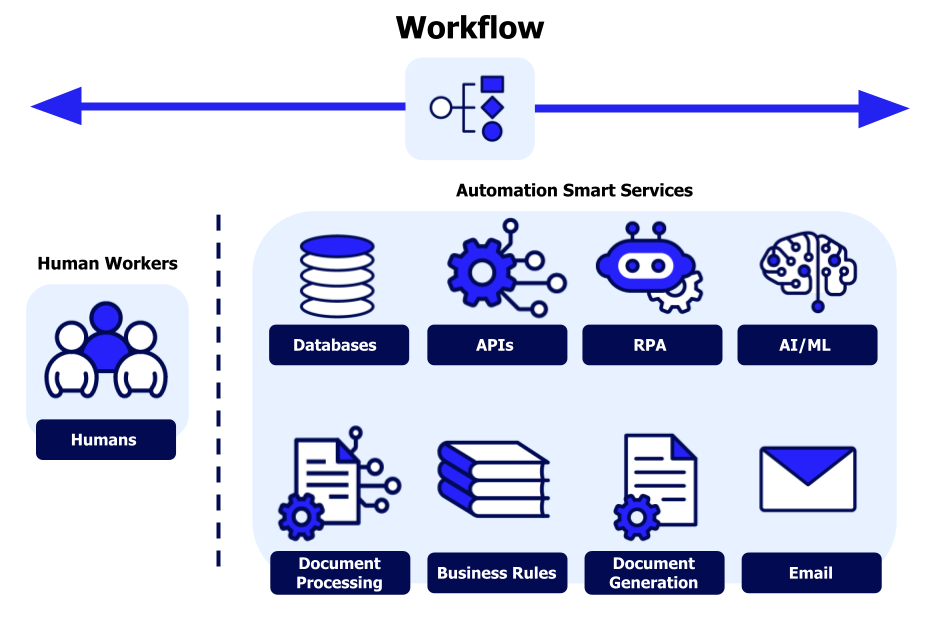What is automation?Copy link to clipboard
Automation describes the shift of tasks from humans to technology applications that are better suited to handle repetitive, time-consuming work. For example, why have a human transcribe a physical application form into an electronic format when software can do it for them? When this task is automated, that person is suddenly free to work on higher impact, more valuable tasks. Similarly, why should an employee fill out multiple forms to enroll staff members in a training? A digital worker, following a set of predictable and replicated steps, can do the same thing faster and more reliably.
This page showcases our automation capabilities you can use to adapt and transform manual tasks to save time, reduce costs, and adapt to changing environments.
Humans remain essentialCopy link to clipboard
Appian lets you combine people, technologies, and data in a single workflow to maximize your resources and improve business results. Workflow describes the synergy between humans and technology. Human tasks and automated tasks combine to complement each other and focus time and energy on the most appropriate types of work. Supporting it all is data, both in Appian and elsewhere. Data is the cornerstone of your applications. With automation, this data is accessible to the people and technologies when and where they need it.
With Appian, automation is not focused on delegating these tasks entirely to digital workers. Instead, automation is strategic, targeted, and scalable. Automation doesn’t seek to eliminate human beings from the process, as a person’s judgment and experience are essential elements that technology can’t replace. Appian’s automation features allow you to build workflows that incorporate people when they can be most effective, rather than having them do every task.
Before you startCopy link to clipboard
Automation is an exciting prospect for any business. This is a fundamental change to your day-to-day operations, so it takes a lot of effort to get buy-in across your organization. That’s on top of the activities to plan, develop, launch, and maintain automations.
Start small, but make plans to scale. As you and your colleagues see the power of automation, it will feel natural to consider integrating these features into your Appian processes. For example, consider automating with business rules and process models before attempting more advanced automation with RPA and AI.
- To discover which specific automation features to use, see When to use automation features.
- To get inspired and read about some use cases our automation capabilities solve, see Use case examples.
Complete automation with AppianCopy link to clipboard
Appian provides you with a complete suite of automation capabilities, so you can automate any task. Process models remain central to all applications by helping you orchestrate everything to combine people, technologies, and data in a single workflow. You’ll use automation capabilities alongside other Appian features that serve as a foundation for your applications.

Automating workflows in Appian is robust and flexible. Many automation use cases can be solved simply using business rules and process models. However, you can also support more complex processes by configuring integrations to external systems and smart services that leverage powerful AI and RPA features.
With Appian, you can automate:
- Human task assignments for manual reviews and human input with process models and Decisions.
- Document generation for PDF, text, or Word documents with smart services.
- Sending emails with communication smart services.
- Connections to modern external systems with APIs and integration rules.
- Interactions with legacy applications with RPA.
- Document processing via artificial intelligence and machine learning with IDP and Appian AI.
More resourcesCopy link to clipboard
Ready to start building with Appian automation?
- To discover which specific automation capabilities to use, see When to use automation.
- To get inspired and read about some use cases our automation capabilities solve, see Use case examples.
- To get a deeper understanding and learn about Appian automation's key capabilities see the Appian AI online courses.
Note: You must log in with an active Appian Community account to view the preceding training materials.
